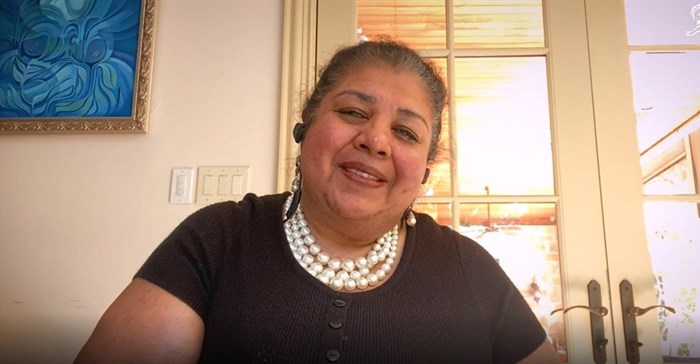#LionsLive: Creative Effectiveness Lions president Ann Mukherjee's briefing
In the third presidential briefing, Cook interviewed the president of the Creative Effectiveness Lions, Pernod Ricard's Ann Mukherjee to hear her briefing for 2021.

Here, Ann will shed light on the new trends she's keeping an eye on, and look back at some of the award-winners that moved the industry forward, helping set the standards of exceptional creativity that the Creative Effectiveness Lions demand today.
Cook: You've judged with us before - that was a couple of years ago, I believe - on the same jury of Creative Effectiveness, so you are well versed in how it works. Now on the first day of judging, you would have had to have given a briefing to your jury to set the tone and set the criteria and give them a few pointers about how they should be judging the work. Can you give us an indication of the briefing you would have given if we'd been able to come together, and also how it made need to adjust for next year?
Mukherjee: For me, when it comes to creative effectiveness, some would argue why do you have to even separate the two and that is a very fair point, but I always start result backwards. The very first thing I would have said to the jury is that the ante to even be considered is, 'Does it have ROI? Does it have an effectiveness that was solving a business problem that the brand had to solve? So, it starts with that, and then once you have established that there is a ROI, then you have to look at the work to say, removing all the other factors, it was the work and what about the work that really elevated people's ability to see the brand in a way that uniquely solved the particular problem that the brand had. How is it that the brand created an environment where the consumer bought into the brand and not just bought the brand. And it inspired a way of thinking that no other creative did. So, it's the brilliance of the creative that really drove that ROI.
Cook: Thinking ahead to the briefing that you're going to have to give next year and how that might evolve - what do you think? Do you think it remains the same or do you think we'll have to change certain elements of that briefing, given the current circumstances we're all facing?
Mukherjee: I think that the criteria is even more important, meaning; given the Covid environment, there are so many external factors that could play into the performance of the ROI. So being very clear about what drove the ROI and what didn't and be able to separate that such that you can get to again, the quality of the idea, and now in the Covid environment even more so.
Great brands speak to human conditions. Great brands help to elevate what we want to think, differently - the art of that possibility. It is what we call magnet creativity, not just mirror creativity. So, it's really critical, even more so in this environment, for that human condition to really come to the forefront, as we judge the work.Cook: It's quite a unique award in many ways. It was actually established back in 2011, so it's nearly coming up to its 10-year anniversary. And of course, it's one of the only awards that recognise the link between creativity and business thriving results. Along the way, different presidents and different juries, of course, have had different perspectives about the correct blend of ROI-based results - hard business results - and of course, wider engagement statistics. I think it was Wendy Clark when she was president of the Creative Effectiveness jury - she was actually the first client to judge the Creative Effectiveness jury - who said: "How can you have creativity without effectiveness?" So based on that, what do you think the correct blend of those two things is going to be?
Mukherjee: To me, one is the ante, which is the effectiveness part. There are multiple ways of being able to measure ROI, but if you can't deliver against an ROI for the brand, the work shouldn't even be considered.
Once you see the ROI, then understanding how the creativity drove that ROI - it's in that part of the judging, that I think you separate the good from great. I have always believed that great creativity starts with timeless stories being told in very timely ways. And it's in the timely idea that helps you see the brand in a way that is so unique, that really was the linchpin of the ROI - that's the way we need to look at it.
Wendy is right, they are very interconnected. You might have decent ROI but it wasn't the creative that drove it. You need to make that linkage to say it was the creative that really drove that ROI.
Cook: What about the language and the tools that you'd be encouraging the jury to use? It's a wider question really - do you think as an industry we should introduce a common language when it comes to describing effectiveness? Something that we can be using as a standard on day-to-day within our own businesses.
Mukherjee: We've debated this point over and over again and now as a CEO, trying to drive a business's PnL, wouldn't it be great if we all had one magic number that we can all align to? The fact of the matter is, every business is different, every industry is different, every problem that a brand is trying to solve is different, so to say that there is one unique set of measurement that will be the magic number that everybody can use, I think is a bit like world peace - it's hard to solve.
But what I do think is important, is that when you judge work, being very clear about what the problem to solve is for the brand and then associating the right, effective measurement to that and then judging the work to see if it met those measurements, is the way to think about it. Because one size does not fit all and at the end of the day, you want to judge work that is Cannes-worthy - to be able to say, it is that greatness of the work, that solved the problem, that delivered the ROI.Cook: In terms of the current situation, going into that a little more if we can... Obviously with Covid-19 presenting another lens, which many of the juries will have to consider when judging the work. Creative effectiveness is quite different - you have to had been shortlisted or won a Lion against creativity, so actually have proved your stripes when it comes to your creative work, in order to even be eligible to enter here. So, the jury will be sitting down in Cannes next year and looking at examples of work which are, what we would call, pre-Covid. How difficult is that going to be, based on the fact that we are entering a new reality right now?
Mukherjee: Yes, I think this notion of your coming in with a frame of reference as a jury and you would have gone through incredible turbulent times. You would have gone through not only a health crisis, but economic crisis, social crisis and so our frame of mind is going to be somewhat tainted. It's going to be already formed in a different way. And I think that's why as a jury, we would have to be very disciplined as practitioners of creativity.
To be able to judge work, and what I call the physics of creativity - and great work should mimic the time and the culture and the society that it was created under - we're going to have to as a jury be very thoughtful about putting ourselves in that right frame of mind and working through the context of which that work was created. And hold ourselves accountable for not overlaying a judgement that wasn't pertinent at the time that the work was developed.So getting into, "Well, would that have worked in today's world?" Well, back then that world didn't exist. So, we going to have to hold ourselves accountable to that higher standard when we judge that work.
Cook: One of the topical things, which actually arose at the Festival last year, was this piece of research from Peter Field, who delivered it, who explained the preoccupation with short-termism and it's actually been proved in the stats, is perhaps not as effective as we perhaps would have thought. And actually, very timely right now, is the longer-term brand building pieces, which are really going to set us up for the future. What do you think about that? How is your own brand making sure that that is a priority?
Mukherjee: Brands that walk away from their timeless story to capture a short-term ROI and chase a trend or chase a fad or chase a social issue, walking away from the tenancy of how the brand was built and how it is established in the subconsciousness of a consumer or a shopper or the user of the service or brand. I think it's dangerous.
Every brand should have a "why" of the brand. Why does the brand exist? Like the magic of Disney, the real beauty of Dove, I can go on. If brands walk away from that timeless "why" of the brand when it tells that narrative, in capturing work on a timely, it will do more damage on the brand long-run, than the short-term gain that it might get in the short term.
Cook: And of course, we're not going to have a bunch of winners this year. And hugely they are the very thing that set the benchmark and set the bar for the year ahead. So, one thing that we can do is look back in history and perhaps some of the more recent winners - and you judged with us recently as well. I wondered if you could tell us about an example of a winner from years gone by that you think still stand the test of time and hope that the winners that you will finally award in 2021 will reach that same calibre and same benchmark.
Mukherjee: There are so many pieces of work that I saw that I judged that were amazing. But one that really, truly stood out to me, and one that I love to talk about is, Ariel, Share the Load, that was done in India.
Let's work backwards from the ROI to the incredible work that we saw that I think really drove the ROI of this brand. Ariel, in India, in that kind of super-premium category, had a huge share opportunity. Consumers did not see the value of the brand. They did not see that it was worth paying more for. And they had a very specific brief from an ROI perspective, in terms of what it needed to do in the Indian market - drive share growth. So it was very clear metrics in terms of what it needed to do.
What I loved about how the work drove that ROI was that it really went into, again, this timely insight around this notion of what it means to be a woman in India today. And the strong biases that exist about what you expect from a woman versus a man.
The ability of this to bring that to the forefront and do it in a way that fit the brand and the category so beautifully and to have an older generation reflect back to the younger generation, gave it validity and authenticity. And then how that just played forward in terms of how that connected to Ariel. Ariel could have gone in with a piece of work that said: "Gosh, this stuff is so easy to use and it's always so good for cleaning, even men can do it" Now that's not motivating. Instead, they were trying to bring in the purchaser, who was the woman, who was this educated woman say, "You know what. This is a brand that gets me and yes, this brand understands what I am going through." That is a wonderful way to make it magnet. It is not mirror. I think it's amazing!
Cook: Just thinking of that particular piece of work and obviously everything that we are facing right now, this huge amount of unrest in the world, especially in the US, where you are based. When it comes to marketing messages that carry important narratives about equality. How will you be thinking about that with your jury, especially next year?
Mukherjee: So for me, I think it's a very critical consideration. As we judge the work, it needs to mirror society. It needs to mirror what we're seeing in culture, and I will tell you, this notion of equality, empowerment and really being reflective of what's the colour, the fabric and the issues and we've got to award work that reflects what society is, what society is grappling with, and to award work that brings that disenfranchised voice to the forefront because I do think great work celebrates that human condition. Both the good of it, the difficulty of it and I think we've got to be conscious as a jury not to just have a Western bias but to have a global lens and be thoughtful to truly understand those contexts when we judged that work.
Cook: I know it seems like a long way off, you've got a whole year before we'll be meeting again to look at the work. What hopes do you have for the winning body of work? Of course, you're not just awarding Golds and a Grand Prix, you're curating a body of work which is going to be recognised, scrutinised by the industry globally and used as a benchmark to set the way forward. So what is your hope for that body of work? What statement would you like it to make to our industry?
Mukherjee: We live in a world today where the status quo is just not good enough. I am hoping that we award work that sets the tone on what it means to challenge norms, to challenge thinking that inspires people to see the art of the possibility and to see that what we do in our craft could actually change the world. And I hope that that's the standard by which we award our work next year.
Cook: So, just to summarise then for your jury, who are probably watching out there, but also for everyone who is tuning in to Lions Live, your summary please of your jury briefing, in one sentence, if you may.
Mukherjee: Make sure that we award work that is absolutely delivering against great business needs, but does it in a way that is done with Cannes-worthy creative, that creates the art of the possibility.
Cook: Ann, thank you so much for taking the time to be with us today and give your thoughts. I'm sorry that we can't get together this year but look forward to you delivering your briefing in person, next year in 2021. And of course, the work that will be awarded at the show next year. Thank you so much.
Be sure to register and watch live or on-demand at LionsLive.CannesLions.com.




































